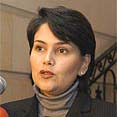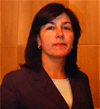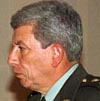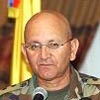 |
| Home | | |
Analyses | | |
Aid | | |
| |
| |
News | | |
| |
| |
| |
| Last
Updated:11/25/03 |
| Memorandum To:
Interested Colleagues Re: Recent changes in the Uribe government Over the last three weeks the government of President Alvaro Uribe has faced a series of challenges. A 14-point referendum of political reforms failed on October 25 for lack of voter turnout, despite heavy campaigning by the president. The next day, opposition candidates won several key posts - including mayor of Bogotá - in municipal and gubernatorial elections. The aftermath of the elections, along with discord that had been brewing within the administration, led to a series of resignations and changes in Uribe's cabinet and the military's high command. Changes in the Cabinet
On November 6, while in a meeting with members of Conservative Party, Minister of Justice and Interior Fernando Londoño stated "if you do declare your opposition, today, we would find ourselves in a political crisis. This political crisis will only be resolved, I believe, with extreme measures-which the President has considered-including calling for early elections."[1] While the comments may have been taken out of context, the mention of early elections caused a huge political uproar. The comments, in addition to the already tense relationship between Mr. Londoño and Colombia's Congress, prompted President Uribe to accept the resignation of his "superminister."
Soon after Londoño's exit, Mr. Uribe appointed Sabas Pretelt de la Vega as his new minister. Mr. Pretelt, a member of the Conservative Party, was President of Colombia's powerful National Federation of Commerce (FENALCO). He was also a strong supporter of Mr. Uribe's referendum initiative. The new minister will face a complex legislative agenda, including economic reforms, controversial anti-terrorist legislation currently before Congress, and structural reforms to the state. "If the FENALCO president's support of the referendum was one of the reasons that led president Alvaro Uribe to notice him, Pretelt must now prove that he can translate the managerial capacity he has displayed as President of FENALCO to his relationships with Congress," indicated the Colombian newsweekly Cambio.[2]
On Sunday, November 9, the Uribe government was shaken by another unexpected resignation: that of Minster of Defense Marta Lucía Ramírez. Ms. Ramirez, Colombia's first female defense minister, gained a reputation for effectiveness at implementing Uribe's controversial "Democratic Security" strategy and radically changing many of the Ministry's practices, including strategies to demand accountability and transparency against corruption. However, her strong character gave way to tensions between the Military High Command. The strain between Ramírez and Armed Forces Chief Gen. Jorge Mora was so tense that, during her last three weeks in office, she and Gen. Mora were not even speaking to each other.[3]
Ultimately, these rifts were seen as counterproductive and President Uribe accepted her resignation. He appointed Jorge Alberto Uribe Echavarría as the
new minister. Mr. Uribe Echavarria has no political or defense
background, but is "part of a select group of people, most of
which are businessmen, who President Uribe consults with on a
regular basis," according to Cambio.[4] During
his first statements, the minister-elect indicated that the Ministry
of Defense "will support the president in search for peace, a
search that may come, if that is the case, to require war." [5]
Housing, Cecilia Rodriguez. While little was said about
the reasons for her departure her replacement has stirred up some
controversy. Sandra Suárez, Uribe's former director for
implementing Plan Colombia, is now charged with protecting Colombia's
environment. Environmental groups believe it sends the wrong message
to appoint an official who actively promoted dramatically expanded
aerial herbicide fumigation as part of her last position.[6] With
only 15 months of public experience, Ms. Suarez will face significant
challenges.
On November 11 General Teodoro Campo, Director of the Colombian
National Police, was asked by the president to submit his
resignation. During his 15 months at the job, four major scandals
rocked Colombia's Police: two tons of cocaine were lost with the
complicity of police agents in Atlántico department; a kidnapping
gang made up of policemen and prosecutors was disbanded; 29 members
of the police were found to be stealing fuel from the institution;
and, most recently, revelations emerged of misuse of funds by
the Medellín police.[7] The
General's lack of action after these scandals was cited as the
main reason for his departure. General Campo has been replaced by Brigadier General Jorge
Daniel Castro Castro. Over his 30-year career with the Colombian
police, Castro has served as Director of the anti-kidnapping (GAULA)
unit, Commander of the Medellín police and chief of the Search
Bloc (Bloque de Búsqueda) to apprehend drug-cartel leaders. Most
recently Castro was the Director of the Bogotá metropolitan police.
In that position Castro focused his attention on the fight against
terrorism and intelligence work, seeking to dismantle FARC cells
in Bogotá. Brigadier General Castro led the so far inconclusive
investigation of the February 2003 bombing of the El Nogal social
club. [8]The
misuse of funds in Medellín also prompted Leonardo Gallego,
Commander of the Medellín Metropolitan Police and a former
head of the police's anti-narcotics division, to present his resignation.
After the departure of Minister Ramírez, Armed Forces Commander General Jorge Enrique Mora
resigned on November 12. The military high command was to have changed by year's end, bringing with it Gen. Mora's retirement; however, after the defense minister's exit, these changes were sped up. Once the new minister was named, reports Cambio, "General Mora began to consider early retirement from active duty. After giving it some thought, he decided to talk with the President. …Uribe agreed with the decision, but asked him to stay on for one more week while the high command was established."[9] On November 18, General Jorge Pineda Carvajal, the Commander of Jungle Brigade 27 based out of Putumayo, was asked to resign due to allegations of misuse of funds while he was Director of Intelligence of the Armed Forces in 2001.
That same day, Defense Minister Uribe confirmed the new military high command. General Carlos Alberto Ospina, former head of the army, is replacing General Mora as the new commander of the armed forces. General Ospina is known as a "soldier's soldier" who enjoys being on the battlefield. Ospina has led the Special Forces and 2nd Mobile Brigade, and directed operation 'Conquista' against narco-trafficking in Guaviare and Vaupés. He also led the Fourth Brigade in Medellín and served as the army's director of operations. The new head of the army is Major General Martín Orlando Carreño. Carreño was the army's chief of operations after leading the army's Second Division in Bucaramanga, Santander department. The chief of the air force is still General Édgar Alfonso Lésmez Abad, who assumed his post in September, and Vice Admiral Mauricio Alfonso Soto Gómez remains as head of the Navy. All
these adjustments come in the wake of the Uribe administration's
first major political defeat. It is clear that some of the changes
within the cabinet were brewing for a long time -Londoño's outspoken
ways had already landed him in trouble more than once, and it
was unlikely that the tension between Ramírez and the military
high command was going to disappear. These two resignations, added
to the electoral defeat, led Uribe to make a series of dramatic
adjustments. For now it may seem that a more profound crisis has
been averted. Yet it is far from clear whether Uribe - who remains
popular in Colombia, according to most polls - will be able to
pursue his agenda as easily as before.
[1] El Tiempo, "Londoño Arma Alboroto Político," November 6, 2003 Can be found online at http://eltiempo.terra.com.co/hist_imp/HISTORICO_IMPRESO/primer_hist/2003-11-06/ARTICULO-WEB-NOTA_INTERIOR_HIST-1311490.html [2] Revista Cambio, "La Hora de Sabas," November 17, 2003. [3] Revista Semana, "Monona," November 17, 2003. [4] Revista Cambio, "Los Secretos del Remezon," November 17, 2003 Available on line at: http://www.revistacambio.com/html/portada/articulos/1714/ [5] EFE News Agency, "Nuevo Ministro de Defensa de Colombia dice que la Paz puede requerir Guerra," November 10, 2003, Can be found on-line at: http://terra.com/actualidad/articulo/html/act165332.htm. [6] El
Tiempo Editorial, "Carambola a Tres Bandas," November 12, 2003. [7] El Tiempo, "Cae la Cúpula de la Policía," November 12, 2003. [8] Ibid. November 12, 2003. [9] Revista
Cambio, "Los Secretos del Remezon," November 17, 2003. |
|
|
| Asia | | |
Colombia | | |
| |
Financial Flows | | |
National Security | | |
| Center
for International Policy |








